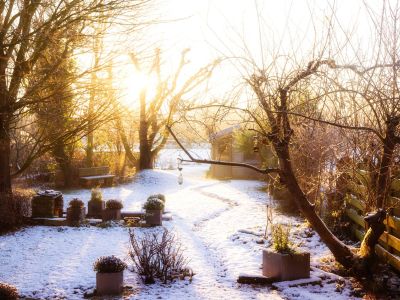What to Do in a Garden in Winter
Most winter gardening tips from experts focus on trees. This makes sense since gardeners often spend the other three seasons cultivating and caring for flowers, vegetables, and shrubs. Let’s look into some winter gardening do’s and don’ts for trees:
Early winter is an excellent time to plant new trees but aim for at least six weeks before the ground freezes. To give those newly transplanted saplings the best opportunity for survival, be sure to keep them watered. If snowfall is scant, continue watering throughout the winter season, whenever the ground is thawed.
Spreading a 2- to 3-inch (5 to 7.6 cm.) layer of mulch or compost around the base of the tree helps protect those new roots from temperature changes and frost heave.
Winter is also an excellent time to trim deciduous trees. Once the leaves are down, the branches are visible. If an ice storm damages the trees, cut back those limbs as soon as possible. Routinely pick up fallen debris to keep this job from becoming too overwhelming in the spring.
Additional Winter Gardening Do’s and Don’ts
By the time winter arrives the flowerbeds, yard, and vegetable garden should be at rest and require little, if any, maintenance. One of the common winter garden mistakes is failing to prepare these areas for the cold season. If fall slipped by too quickly, be sure to review these winter gardening do’s and don’ts and complete required tasks before the snow begins to fall:
Do pick up fallen leaves. Thick mats of leaves will smother the lawn and promote fungal growth.
Don’t let perennial weeds overwinter in flowerbeds. The roots will become well-established during the winter months, which makes weeding much harder next year.
Do deadhead flowers with invasive tendencies. Seeds from manageable species can be left in place as winter forage for wild birds.
Don’t trim shrubs or fertilize during the winter months. These tasks can stimulate premature growth and result in damage to the plant.
Do wrap trees and shrubs near roads and driveways to protect them from salt spray and falling temperatures. Wrap the base of trees to deter rodents and deer from chewing the trunks.
Don’t let your irrigation system freeze. Follow manufacturers recommendations for purging and winterizing your sprinkler system.
Do clean off the vegetable garden and properly dispose of diseased or pest-infected vegetation.
Don’t leave container plants outdoors without protection. Move the planters close to the foundation of the house, bury them in the ground, or cover with a heat-retentive blanket. Better yet, move containers into a garage or storage area.
